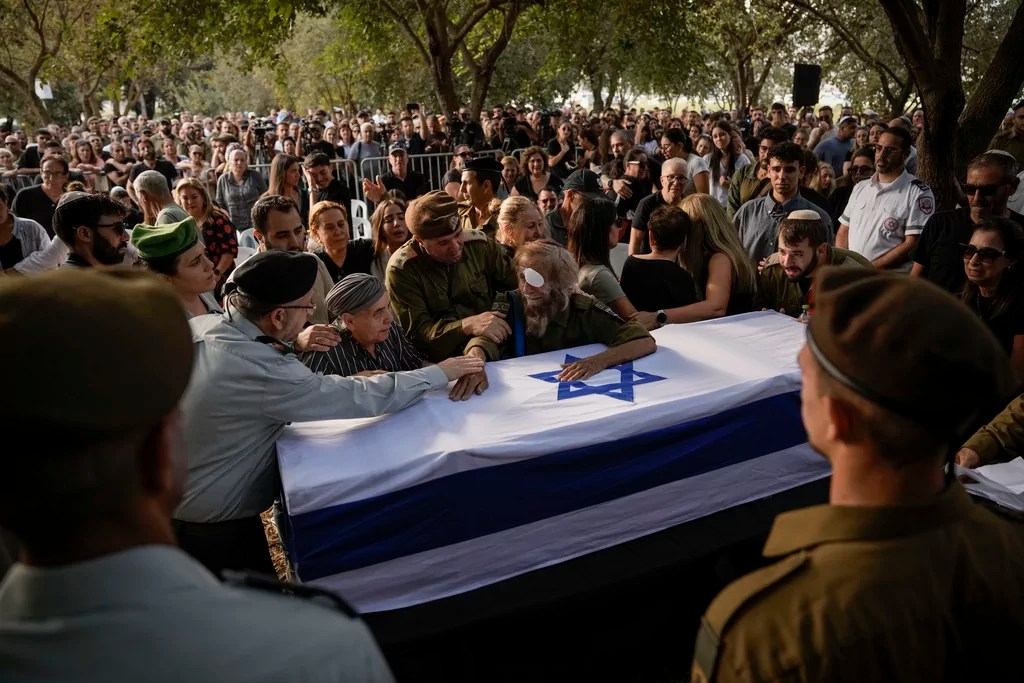


A Hezbollah-fired drone that killed at least four Israeli soldiers and injured dozens of others is the latest incident of an unmanned aerial vehicle bypassing the country’s air defense systems.
The Hezbollah drone hit the dining hall of the IDF Golani Brigade Training Base near Binyamina, a town north of Tel Aviv that is about 40 miles from the Lebanese border, killing four troops and severely injuring seven others on Sunday night. More than 60 troops were injured in total.
Minutes before the drone hit the dining hall, air sirens went off in northern Israel as it flew overhead, but the sirens did not go off on the base, according to the Associated Press. A pair of drones entered Israeli airspace, and one was shot down, but the other one was not intercepted. The IDF said they’re investigating the attack.
It was the deadliest attack on IDF troops inside Israeli territory since the war began.
The deadly attack demonstrated both a vulnerability in Israel’s air defense system as well as Hezbollah’s capability to continue these types of operations despite Israel’s escalation over the last several weeks.
“It’s clearly a vulnerability,” Rich Goldberg, a senior adviser for the Foundation of Defense of Democracies, told the Washington Examiner after a previous Hezbollah drone went undetected by Israel’s air defenses.
Israel employs a multilayered air defense system designed to be able to take out short-range rocket fire and medium- and long-range missiles, but drones have repeatedly gotten through Israel’s defenses over the course of the last year since the country has been on a war footing.
Drones don’t pose an “existential threat, but it certainly poses a nuisance to citizens and the security system,” Yehoshua Kalisky, a senior researcher at the Institute for National Security Studies in Tel Aviv, said.
UAVs are hard to intercept, he said, due to their size, low radar signature, and maneuverability.
“The tragic case in Binyamina proves that in Israel, because of its small and populated area, the margin for error is negligible. In other words, Israel doesn’t have the privilege to miss an interception, and the issue is technologically challenging,” Kalisky added.
Drones fired from close to Israel, like by Hezbollah from Lebanon, provide much less time to intercept it than a drone fired from further away. U.S.-designated terrorist groups based in Gaza, Lebanon, Iraq, Iran, and Yemen have fired projectiles toward Israel over the last year.
Another Hezbollah drone slammed into a nursing home in central Israel last week. No one was injured in the attack, while earlier this month, two Israeli soldiers were killed in a drone attack that was launched from Iraq.
Back in July, the Yemeni-based Houthis launched a drone that also evaded Israel’s air defenses. It hit an apartment in Tel Aviv, killing one civilian and injuring about 10 others. A month earlier, Hezbollah released a nine-minute video of a critical military base in Haifa about 15 miles from the border that came from a drone that seemingly went undetected by the Israeli air defenses.
Separately from the drone vulnerability, the United States announced on Sunday that it would be deploying an advanced air defense system to Israel with troops to operate it. The THAAD system, also known as the Terminal High-Altitude Area Defense battery, is a ground-based interceptor designed to shoot down ballistic missiles. It requires about a hundred troops to operate the system.
CLICK HERE TO READ MORE FROM THE WASHINGTON EXAMINER
The U.S. military has aided Israel’s defense during two large-scale Iranian attacks in April and October, though neither time was from inside Israel. Israel is considering how to respond to Iran’s October attack, and it could incur another retaliatory attack from Tehran.
President Joe Biden directed Secretary of Defense Lloyd Austin to authorize the deployment of the Thaad battery and associated troops “to help bolster Israel’s air defenses following Iran’s unprecedented attacks against Israel on April 13 and again on Oct. 1,” Pentagon spokesman Maj. Gen. Patrick Ryder said in a statement.
